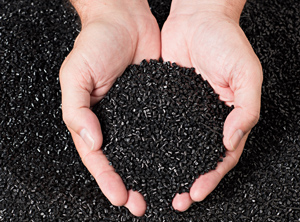TEKNOR APEX
Supply of “Creamid” glass-filled PA compounds in Americas and Asia / New grades offer "enhanced" physical capabilities / Replacement for automotive metals and thermoplastics
 The "Creamid" polyamide compounds can replace metal in automotive parts (Photo: Teknor Apex) |
US compounder Teknor Apex (Pawtucket, Rhode Island; www.teknorapex.com) has announced that its new “Creamid” glass-filled PA compounds are now commercially available for the first time in the Americas and Asia. They are already used in Europe for automotive components such as air vents, spoilers, fan blades, spring adapters and key fobs.
The compounds were originally developed by Plastic-Technologie-Service (PTS, Adelshofen-Tauberzell / Germany; www.pts-marketing.de), a custom compounder that Teknor Apex acquired in 2016 – see Plasteurope.com of 05.04.2016.
“Our introduction of these products is the first commercial initiative by Teknor Apex in what will be an extensive expansion of our portfolio of engineering thermoplastic compounds, drawing on the diverse range of unique ETP [engineering thermoplastic] technologies developed by PTS,” said Brian Rickard, director of strategy and business development for Teknor Apex’s ETP division.
The company said the range offers enhanced processability and physical properties compared to standard glass-filled PA compounds, enabling injection moulders to meet more demanding metal-replacement applications or replace alternative thermoplastics. For instance, said Teknor Apex, when compared with a standard 43% glass-filled PA, a 40% glass-filled Creamid compound shows a 68% improvement in spiral flow tests, reaches a 41% lower peak injection pressure and requires 43% less clamp force, giving a wider processing window, reducing warpage and enhancing overall efficiency.
Teknor Apex also pointed out that in metal-replacement applications, Creamid compounds are frequently formulated for a high flexural modulus, giving moulded parts excellent dimensional stability. They also have a tensile strength of up to 260 MPa, a property the company said was more commonly expected from die-cast aluminium or zinc. Rickard said that when combined with longer tooling life and lower material cost, metal-replacement projects with Creamid compounds typically produce very high returns on investment for OEMs
The compounds were originally developed by Plastic-Technologie-Service (PTS, Adelshofen-Tauberzell / Germany; www.pts-marketing.de), a custom compounder that Teknor Apex acquired in 2016 – see Plasteurope.com of 05.04.2016.
“Our introduction of these products is the first commercial initiative by Teknor Apex in what will be an extensive expansion of our portfolio of engineering thermoplastic compounds, drawing on the diverse range of unique ETP [engineering thermoplastic] technologies developed by PTS,” said Brian Rickard, director of strategy and business development for Teknor Apex’s ETP division.
The company said the range offers enhanced processability and physical properties compared to standard glass-filled PA compounds, enabling injection moulders to meet more demanding metal-replacement applications or replace alternative thermoplastics. For instance, said Teknor Apex, when compared with a standard 43% glass-filled PA, a 40% glass-filled Creamid compound shows a 68% improvement in spiral flow tests, reaches a 41% lower peak injection pressure and requires 43% less clamp force, giving a wider processing window, reducing warpage and enhancing overall efficiency.
Teknor Apex also pointed out that in metal-replacement applications, Creamid compounds are frequently formulated for a high flexural modulus, giving moulded parts excellent dimensional stability. They also have a tensile strength of up to 260 MPa, a property the company said was more commonly expected from die-cast aluminium or zinc. Rickard said that when combined with longer tooling life and lower material cost, metal-replacement projects with Creamid compounds typically produce very high returns on investment for OEMs
06.09.2017 Plasteurope.com [237732-0]
Published on 06.09.2017

 German version of this article...
German version of this article...